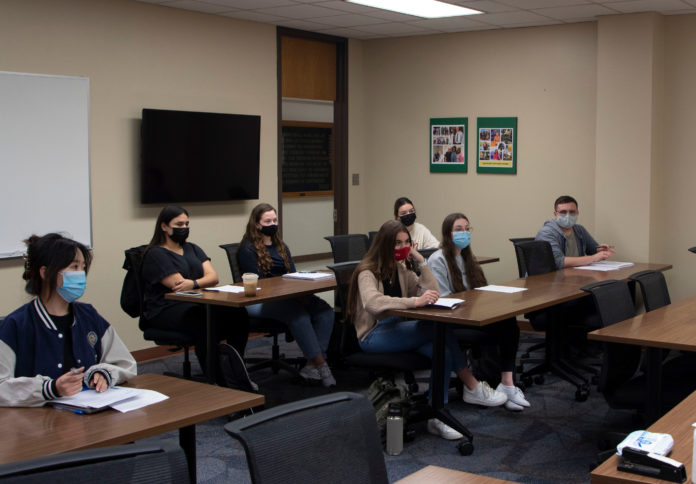By Luke Araujo | Staff Writer
As staff and students return to campus following a long winter break, concerns have been raised by parents, staff and students about the surge of COVID-19 cases across the country.
Many of the cases reported have been of the omicron variant, which is a variant of COVID-19 that appeared in November 2021 and spreads more easily than the SARS-CoV-2 virus, according to the Centers for Disease Control and Prevention.
In a Presidential Perspective sent to Baylor students and faculty on Jan. 3, President Linda Livingstone said the spring semester was to start in person. In the email, Livingstone said students will have to wear face coverings “for at least the first two weeks of the spring semester for all classrooms and labs when used for academic instruction.”
Baylor Interdisciplinary Core (BIC) instructor and adjunct professor Meg Wallace said she takes issue with the fact that there is no online choice for students in their core curriculum.
“I am unhappy that they are not allowing an online option,” Wallace said. “I don’t see a good reason to put people in harm’s way in the classroom when we could easily start the semester online and go back in person once the omicron numbers come down.”
Wallace said she thinks the lack of online classes is a matter of “disability justice.”
“Some students and instructors or their family members have conditions that make them especially vulnerable, and students and instructors stand to be penalized if they opt not to attend in person to keep themselves and their loved ones safe,” Wallace said. “I don’t see a good reason for taking that risk when we could so easily avoid it by starting the semester online, as many other universities are doing.”
Regarding the omicron variant, Wallace said she is concerned people are not treating it with the same urgency as the delta variant.
“Delta wasn’t nearly as contagious as omicron is now, and the vaccines were able to keep it in check,” Wallace said. “Omicron is a whole new ball game, so we can’t act like we are in just as good of a situation as we were in the fall.”
Wallace said Baylor should have followed through with the idea to temporarily hold classes exclusively online like the university had mentioned in an email as a potential way to start the semester.
“I think what is going to happen is we are going to wind up online as a reaction to a lot of people getting sick,” Wallace said. “We got good at online learning and instruction. We learned how to do it. Let’s build on that learning now.”
Dr. Thomas Spitzer-Hanks, lecturer for the BIC, spoke on the topic and said he dislikes the need for face coverings but believes they are necessary.
“I don’t like teaching in a mask, and I don’t like not being able to see my students’ faces,” Spitzer-Hanks said. “From that point of view, my stance is negative. But from a public health point of view, it’s positive.”
Spitzer-Hanks said his reasoning was protecting the staff who are older and more at risk of complications.
“We have this population of 18- to 22-year-olds who are mostly pretty healthy,” Spitzer-Hanks said. “But professors are generally at least 20 years older, if not 40 to 60 years older. So, I think particularly in classrooms, it is important to protect these older folks that we have teaching. I do think masks should be required in the classroom while there is significant danger of community spread.”
Addressing the difficulties of deciding on COVID-19 safety measures, Spitzer-Hanks said he believes there is a balance that needs to be struck between scientific advisement and people’s needs.
“The science probably says we should have gone online,” Spitzer-Hanks said. “But the professors much prefer teaching in person, the students much prefer learning in person and students’ parents much prefer paying for in-person learning. At a certain point, you have to figure out how to balance science and the actual situation on the ground and the preferences of the people who have to undergo this process. I think they made the right call, but I think it was a hard call to make.”
Time will tell how Baylor decides to handle COVID-19 safety protocols in the future. In the meantime, these protocols will continue to be a daily presence in the lives of students and faculty as the spring semester is set in motion.






